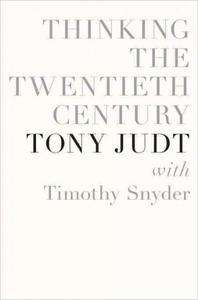Thinking the Twentieth Century

Editorial Penguin USA
Fecha de edición febrero 2012
Idioma inglés
EAN 9781594203237
432 páginas
Libro
encuadernado en tapa dura
Resumen del libro
An unprecedented and original history of intellectual life throughout the past century. Thinking the Twentieth Century is the final book of unparalleled historian and indomitable public critic Tony Judt. Where Judt's masterpiece Postwar redefined the history of modern Europe by uniting the stories of its eastern and western halves, Thinking the Twentieth Century unites the century's conflicted intellectual history into a single soaring narrative. The twentieth century comes to life as the age of ideas-a time when, for good or for ill, the thoughts of the few reigned over the lives of the many. Judt presents the triumphs and the failures of public intellectuals, adeptly extracting the essence of their ideas and explaining the risks of their involvement in politics. Spanning the entire era and all currents of thought in a manner never previously attempted, Thinking the Twentieth Century is a triumphant tour de force that restores clarity to the classics of modern thought with the assurance and grace of a master craftsman. The exceptional nature of this work is evident in its very structure-a series of luminous conversations between Judt and his friend and fellow historian Timothy Snyder, grounded in the texts of their trade and focused by the intensity of their vision. Judt's astounding eloquence and range of reference are here on display as never before. Traversing the century's complexities with ease, he and Snyder revive both thoughts and thinkers, guiding us through the debates that made our world. As forgotten treasures are unearthed and overrated thinkers are dismantled, the shape of a century emerges. Judt and Snyder make us partners in their project as we learn the ways to think like a historian or even like a public intellectual. We begin to experience the power of historical perspective for the critique and reform of society, and for the pursuit of the good and the true from day to day. In restoring and indeed exemplifying the best of the intellectual life of the twentieth century, Thinking the Twentieth Century charts a pathway for moral life in the twenty-first. An incredible achievement, Thinking the Twentieth Century is about the life of the mind-and about the mindful life.
Biografía del autor
x{0026}lt;P x{0026}lt;B Tony Judt x{0026}lt;/B (Londres, 1948-Nueva York, 2010) realizó sus estudios en el King's College de Cambridge y en la École Normale Supérieure de París. Impartió clases en las universidades de Cambridge, Oxford, Berkeley y Nueva York, y en esta última ocupó la cátedra de Estudios Europeos, que él mismo fundó en 1995, y fue director del Remarque Institute.Entre sus publicaciones cabe destacar x{0026}lt;I El peso de la responsabilidadx{0026}lt;/I (Taurus, 2014), x{0026}lt;I ¿Una gran ilusión?x{0026}lt;/I (Taurus, 2013), x{0026}lt;I Pensar el siglo XXx{0026}lt;/I (Taurus, 2012), x{0026}lt;I El refugio de la memoriax{0026}lt;/I (Taurus, 2011), x{0026}lt;I Algo va malx{0026}lt;/I (Taurus, 2010), x{0026}lt;I Sobre el olvidado siglo XX x{0026}lt;/I (Taurus, 2008), x{0026}lt;I Pasado imperfectox{0026}lt;/I (Taurus, 2007), x{0026}lt;I Postguerrax{0026}lt;/I (Taurus, 2006), considerado uno de los diez mejores libros de 2005 por la x{0026}lt;I New York Times Book Reviewx{0026}lt;/I , galardonadocon el Premio Council on Foreign Relations Arthur Ross y finalista del premio Pulitzer, y x{0026}lt;I Cuando los hechos cambianx{0026}lt;/I (Taurus, 2015). Judt colaboró en diferentes medios de Europa y Estados Unidos, como x{0026}lt;I The New York Review of Booksx{0026}lt;/I , el x{0026}lt;I Times Literary Supplementx{0026}lt;/I o x{0026}lt;I The New York Timesx{0026}lt;/I . En 2007 recibió el Premio Hannah Arendt, y en 2009 el Orwell Prize for Lifetime Achievement. Falleció en agosto de 2010 a causa de una enfermedad degenerativa.x{0026}lt;/P








